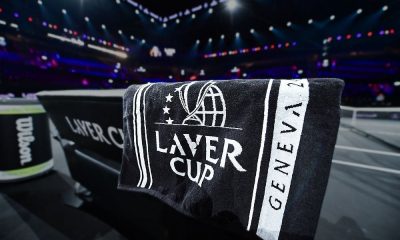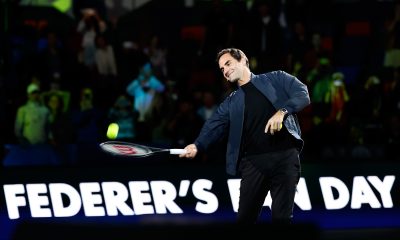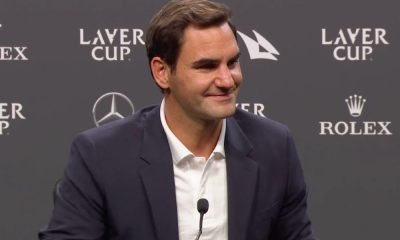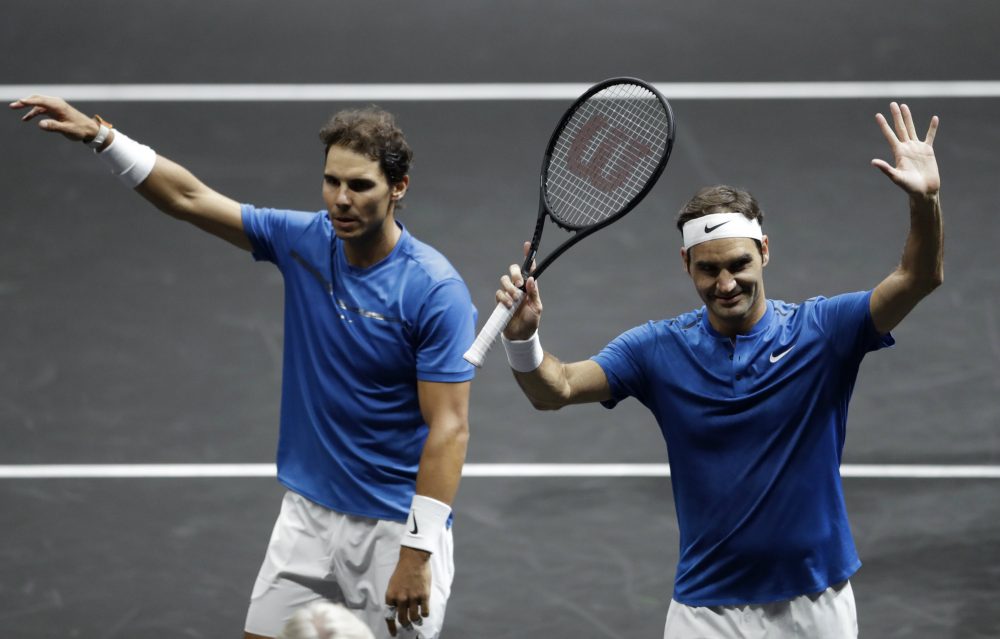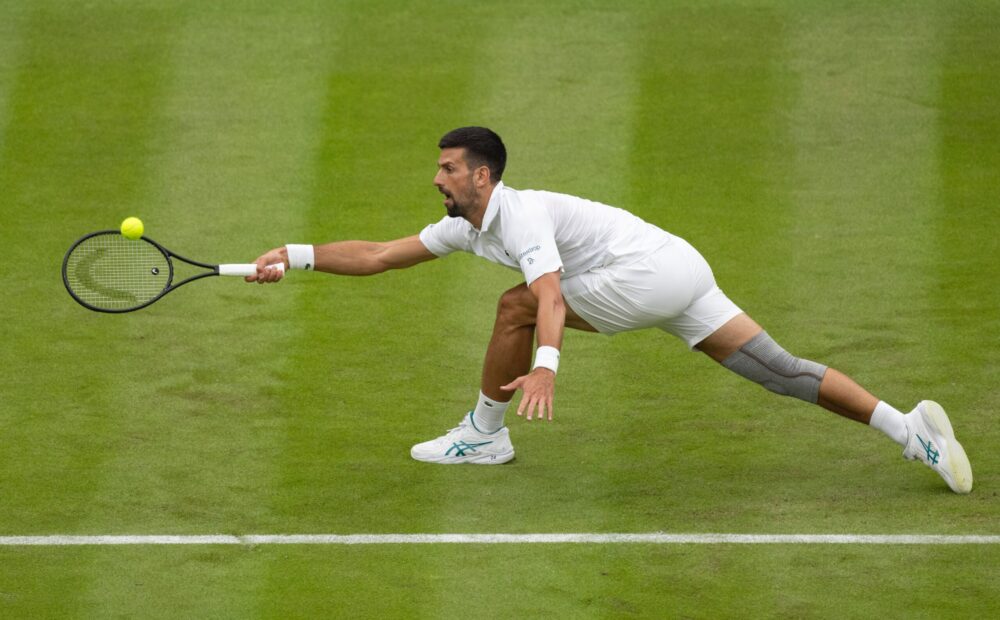TENNIS ATP Monte-Carlo – S. WAWRINKA/R. Federer 4-6 7-6 6-2 An Interview with Roger Federer
Q. I’m sure you’re very disappointed.
ROGER FEDERER: Not so disappointed, no.
Q. But losing against Stan, your friend, partner in our Davis Cup team, that gives you some positive thought. Maybe it’s not so bad.
ROGER FEDERER: Exactly. You make it sound so bad, and at the end it’s not so bad.
I started from not so bad to a bit frustrated that maybe you don’t win it. Like you said, I think it’s one of the those finals that I could have won. But Stan, you know, was tougher at the end. I think he deserved it just a little bit more.
Clearly it would have been nice to win that second set tiebreaker. I didn’t necessarily play a bad one, but also at the same time I didn’t quite ever get into the lead where things went my way.
Of course, I’m very happy for Stan. It’s a huge win for him after winning his first Grand Slam this year, also to win his first Masters 1000. To take the opportunities when they’re there, that’s key in a tennis player’s career. So I’m very happy for him.
Q. Is it more difficult to play with the same usual intensity against a friend with whom you have played and practiced in the morning? Did you feel something was missing today in your will to come back?
ROGER FEDERER: No.
Q. How do you explain in the last eight serves of Wawrinka, you made only six points?
ROGER FEDERER: I think he served better. He definitely found his range. As the match went on, he started to feel more and more comfortable. I struggled to put him under pressure enough. I think it was a bit of both players: him raising his game, me maybe going down a notch.
I think it’s a big match, regardless of the opponent, because it’s a finals. Playing Stan just adds to the excitement in some ways.
The thing is just that you really know the patterns well of the other player. I know patterns well when I play Novak, Rafa, or Murray for that matter. Of course, they can surprise you to a degree, but it’s more surprising when you play somebody for the first time.
With Stan, we’ve practiced so much together and played each other also quite a lot, so I really know his patterns, he knows mine. Very rarely can we really, like on match point, hit a clean winner like that. Okay, he chased the line and it worked for him.
So many points end, you know, in overpowering or out maneuvering your opponent because you know the patterns so well. That’s the biggest change I felt in the match today against somebody I know so well.
Q. Can you explain why the third set got away from you? Your level dropped? Stan was more aggressive?
ROGER FEDERER: A bit of both. I don’t think I served quite so well early on in the third set. Like I said, I think he really found his range and started to hit bigger, deeper. He didn’t miss that many second serve returns anymore. He gave me a couple cheap points in the first couple sets which he later on really didn’t give me anymore. So it made it tougher for me.
Maybe got into some bad starts to my service games which then allowed him to sort of open up a bit. I think clearly he was relieved as well winning that second set that gave him that extra belief or looseness to his shots which he was missing a little bit midway through the second, which was normal, because he was under pressure trying to stay in the match.
Q. For sure it is the first tournament on clay. After this tournament, looking to Djokovic and Nadal, who had some problems, do you think the players who go very well to Roland Garros is bigger now?
ROGER FEDERER: What’s bigger?
Q. More players, they can play better and win Roland Garros. You and Wawrinka could possibly be winners.
ROGER FEDERER: Yeah, but I still think we would have had an outside chance would we have lost first round. For me it doesn’t change. It’s still the same.
Nothing happened to Rafa really. He just lost a match, which happens. But he’s fine. I’m sure he’ll be his usual self again moving forward.
With Novak it’s a bit more of a question mark. If he’s in great shape, he’s clearly one of the big favorites with Rafa. Everybody else sort of comes after that.
I think we’re right there as well with Stan now. We’ve put ourselves in positions time and time again. This was one of those weeks we were able to capitalize on it. Stan did the same at the Australian Open. I did it in Dubai. It’s definitely a good start to the season for I think all four of us really.
I would have loved to have won a second title because I’ve come close a few times. That’s my next objective, that I get to the very end more frequently. But clearly I’m happy that the clay court season started so well for me.
Q. You play so much at the net. Is this a new key of the new Federer by Edberg or…
ROGER FEDERER: I mean, I think I’ve always tried to come in to a degree. When I started with Tony Roche, everybody thought I was at the net more. When I started with Paul Annacone, everybody thought I was at the net more. Now I started with Edberg, everybody thinks I’m at the net more.
You think back, I actually was at the net, more than other players. I think I’m continuing that trend. I must say I feel actually quite confident and good at the net. I’ve definitely gone through phases as well in my career where I didn’t just quite feel it at the net. But now I think when I’m coming to net, I’m choosing the right shots to come in. I’m reading the plays well. I’m moving well at the net, even though on clay it’s always a bit tricky with not having the grip so much like on the hard courts.
It’s something I definitely have to keep on doing. I can play from the back sometimes. I can hit flat sometimes. I definitely also have to mix it up by coming forward a bit more often.
Maybe I should have done it a bit more today. But I still think I played okay throughout this tournament and also in the match today.
THE MODERATOR: Questions in French for Roger.
Q. You played a lot since the beginning of the season. Did you have less intensity at the end of the match because of it? Besides, what is your schedule now?
ROGER FEDERER: I’m going back home because I need to recuperate. I played with a lot of intensity during the past month and I’m happy that I can relax. I wasn’t able to do that after Geneva. I feel that I’m tired. My body feels strange and I need to sleep.
At the end of the third set, after the fifth day in a row of playing, I might have lacked that 2% that made a difference. But the credit is for Stan. He was able to stay in the match.
Q. From outside this final, it seemed a family party with the older brother playing against the younger brother. Everybody was giving back points to the opponent.
ROGER FEDERER: Well, it was, of course, a great pleasure to share this moment with Stan. As to the line calls and everything, it was just as it normally should be between players.
I didn’t feel frustrated. I was happy for Stan. I was congratulating him. As far as I’m concerned, I focused on myself. I didn’t look at Severin. I didn’t want anybody to feel uneasy. The important thing was that everybody agreed.
It was all right with me because I played so many finals already. I was relaxed. The important thing was that Stan had to feel comfortable. Before anything else, it was a tennis celebration on a beautiful court.
Q. Did you get enough information about what you had to work on?
ROGER FEDERER: In the beginning of the clay court season, you always work on many things. It is non stop. You’re reassessing your game all the time. It was good that Pierre was there. He was able to see live how I was moving on the court.
My tennis game is pretty good. Sliding was more difficult. It was slippery at times. But the more you play, the more you get used to it. I’m very happy with this week.
Q. You were saying you were tired. Are you still going to play Rome, Madrid and the French Open?
ROGER FEDERER: That’s the plan. It’s just after those five days and playing a lot the past month that I was feeling a bit tired after the second set. I still tried whatever I could to stay in the match.
The beginning of the third set was a bit tough. He was on the rise. I tried to start my engine again, and somehow I didn’t really succeed. But my schedule is open and the plan is to play Rome, Madrid and the French Open.
Q. Here you were not far from winning. Are you satisfied with that or do you really want to be able to go one step further and win it?
ROGER FEDERER: Well, you must see the positive side. Try not to be disappointed or frustrated. What I see is that if I’m in that position again, if I keep trying as I did, at a certain point it’s going to go my way, like it did in my match against Jo.
If you feel good mentally, then things are going to turn out good. Winning a Masters 1000 is never easy anyway.

 Hot Topics3 days ago
Hot Topics3 days ago
 Latest news3 days ago
Latest news3 days ago
 Hot Topics2 days ago
Hot Topics2 days ago
 Hot Topics3 days ago
Hot Topics3 days ago
 Focus2 days ago
Focus2 days ago
 Focus2 days ago
Focus2 days ago
 Focus2 days ago
Focus2 days ago
 Hot Topics2 days ago
Hot Topics2 days ago



